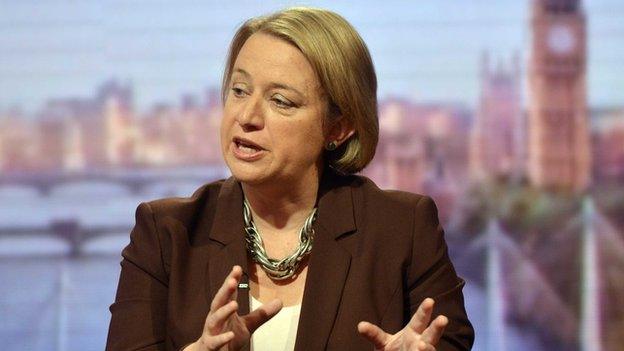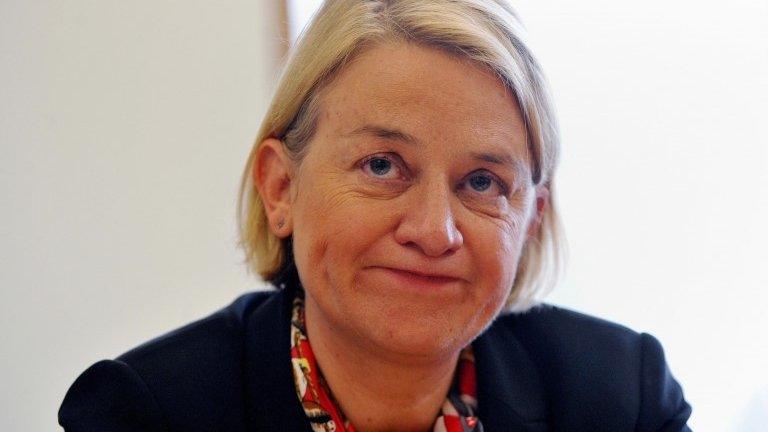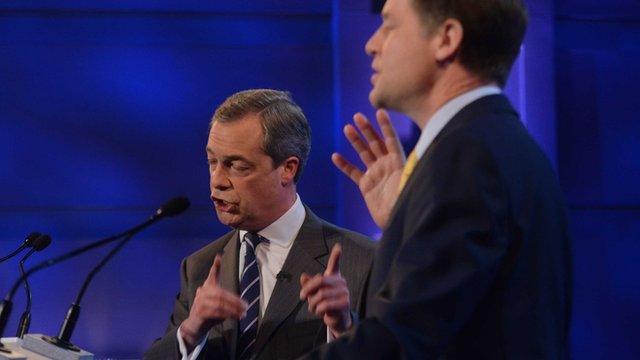David Cameron will refuse TV debates if Greens excluded
- Published
As Nick Robinson reports, some of David Cameron's opponents are saying the Prime Minister is "chickening out" of the debates
Prime Minister David Cameron has said he will not take part in TV debates ahead of the general election unless the Green Party is also included.
Mr Cameron told BBC North West Tonight it was a question of fairness.
He said he did not see how "some minor parties like the Liberal Democrats and UKIP" could take part in the leaders' debates, but not the Greens.
Labour leader Ed Miliband has said the PM "owes it to the people" to take part.
The current proposals for the TV election debates only include the Conservatives, Labour, the Liberal Democrats and UKIP.
The suggested schedule is for debates on 2 April, 16 April and 30 April, ahead of the election on 7 May.
BBC political editor Nick Robinson said the PM had told his allies he would be happy to see no debates at all during the election campaign itself.
Farage included
UKIP leader Nigel Farage has been invited to take part in one of the debates.
Another features the Conservative, Labour and Lib Dem leaders, and a third would just involve Mr Cameron and Mr Miliband.
Mr Cameron said he would like the debates to take place "but you can't have some minor parties in and not other parties in".
He went on: "The Greens have a member of parliament, they beat the Liberal Democrats in the last national election - the European Elections, so I don't see how you can have UKIP and not the Greens. That is my very strong opinion."
He also suggested that if the debates do take place they should be held before the official general election campaign begins.
The BBC's Nick Robinson said the PM's private view was "if we, the Conservatives, are to get hurt by the people to our right, UKIP, then Labour and the Liberal Democrats should get hurt by people to their left, the Green Party".

Green Party leader Natalie Bennett gave Mr Cameron's comments a cautious welcome
UKIP leader Nigel Farage said the PM was "running scared", and called him a "chicken" on Twitter, external.
Mr Farage claimed Mr Cameron was using the Greens "as an excuse" not to have a debate with UKIP, and said the debates should go ahead without him.
Mr Miliband said Mr Cameron was "chickening out" and "trying to find any excuse to stop these debates happening", saying he should "stand on his record".
But Mr Cameron rejected the claim in his interview with the BBC, pointing out that he took part in the TV leaders' debates in the run up to the 2010 election.
Lib Dem Deputy Prime Minister Nick Clegg said Mr Cameron should "stop ducking and weaving" and commit to taking part. He said the public expected the debates to take place.
Meanwhile, a consortium led by the Guardian,, external the Daily Telegraph, external and YouTube has offered to host a live digital pre-election debate with the leaders of all the UK's five main political parties.
This would cover the Conservatives, Labour, Lib Dems, UKIP and the Greens, and held around the time of the dissolution of parliament at the end of March.
'Deeply disappointed'
Ofcom has said the Green Party had not demonstrated significant support in previous general elections to be considered a "major party" ahead of May's election.
The party said it was "deeply disappointed" at the regulator's stance.
Alongside the SNP and Plaid Cymru, the Greens have been calling for inclusion in the televised debates.
Asked by ITV News whether he would not take part unless the Greens were involved, Mr Cameron said: "Correct. I don't think the current proposal will work.
"You can't have one minor party without having another minor party. And I think that's only logical and fair."
When they unveiled their proposals for the debates, the BBC, Sky, ITV and Channel 4 said they reflected "changes in the political landscape" since the three prime ministerial debates during the 2010 general election.
Each of those debates featured Mr Cameron, Mr Clegg and Labour's Gordon Brown.
The broadcasters say they "remain committed" to providing televised election debates and will "continue to work" with all the parties to ensure they happen in 2015.
- Published8 January 2015

- Published13 October 2014
